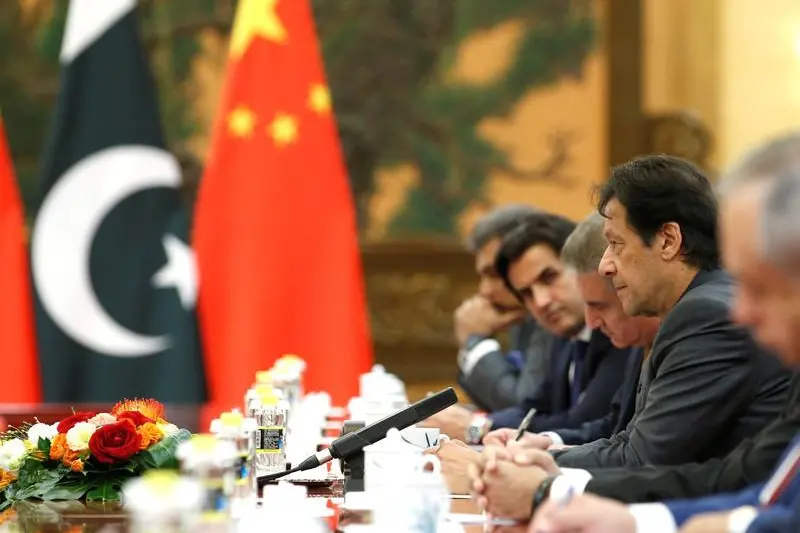PHOTO
Well, Imran Khan brought a nice big cake back from China, but it was without that cherry on the top that he so desperately wanted. The 15 MoUs are all very nice - ranging from education to industrial cooperation - but Beijing poured some cold water on the hopes of a Saudi-like, preferably twice the size, 'bailout package'. It turns out that the Chinese would like to talk a little more before routing $6 billion of their own reserves to our central bank's vaults where they can just sit and make the foreign reserves look pretty.
Everybody knows that the Chinese CPEC investment in Pakistan already touches the $50 billion mark. That they still want multi-tiered negotiations for a paltry $6b 'friendly loan' that would only last a year ought to have prompted some soul searching in the ruling party. Yet it didn't stop Finance Minister Asad Umar from declaring that, because of Saudi and Chinese help, Pakistan's balance of payments crisis is suddenly over.
But is it? Imran brought back a $12b package from Saudi - $3b in our books, $3b deferred oil payments for three years - even though Umar kept saying $6b in his press conference. Top that with the $6b the PM was so sure to get from China and you would have suddenly had an extra $9b to show in the reserves. Very impressive, indeed, only that a Chinese bailout is still in the works.
But what about that little stipulation that we cannot touch any of this money? How does that help with the immediate payments that got the PM hopping from country to country in the first place? Surely, we'll have to do more than showing creditors our reserves position when they come asking for their money. Wouldn't that be like me owing 10 rupees and having only four, but when I borrow six from the editor it's on the condition that I cannot make payments with it? Or like upgrading the fire brigade, after much begging and pleading, only to know that the new water cannot be used to put out fires. Does that really help beyond headlines? Plus, these transfers have a one-year deadline. What will the finance minister say about the BoP position once it expires?
The other great achievements - Saudi oil on deferred payments and local currency trade with China - are hardly novel. Similar oil deals go back to the first Gulf War, then when we went nuclear, and pretty much throughout the Musharraf years. Didn't do the economy much long term good, did it? And the currency swap with Beijing goes back to 2011. And the only reason it never took off was practically zero interest from the local banking and business community.
As for more money in the bank means less stringent deals with the IMF; well, we'll see soon enough. No doubt the Fund, of all institutions, understands just how hamstrung we are despite the favours from friendly countries - and there's still no explanation about the terms and conditions of these friendly 'bailouts'. Plus, we still have to see how US concerns about more IMF money - which Mike Pompeo at least was pretty sure would end up in Chinese banks - play out as negotiations progress.
That's not all. Imran jetted off to Beijing just as the country descended into crisis - stemming from the Supreme Court's landmark ruling on a blasphemy case. But the economic firefighting was more important, we were told, since failure meant probable default. News reports later confirmed that Khan had gone without finalising anything with the Chinese. After he'd been there five days they still wanted to talk more, that too at much lower levels. Meantime, his government buckled under the crisis back home and ended up losing points on both fronts.
Three months into the government, then, and it seems PTI is reacting far more than acting. But there's a good reason that Imran has received such hard press, as well as social media reaction, than previous administrations. He came with a cleaner slate and sincerer promises than the usual lot.
He compromised his position, though, by taking on deserters from other parties in the buildup to the election; not to mention the pretty much established public understanding that for the last few years, at least, he's been the new darling of the so-called establishment. But he's never stolen public money or grown rich as the country was choked with unproductive debt. But the proof of the pudding will always lie in the eating. So far, the new government has struggled on the economic front, completely failed in establishing state writ and made moves that have raised prices and squeezed the job market. Despite his sincerity, Imran's government isn't quite working like a well-oiled machine.
Shahab Jafry is a senior journalist based in Lahore, Pakistan
Copyright © 2018 Khaleej Times. All Rights Reserved. Provided by SyndiGate Media Inc. (Syndigate.info).





















